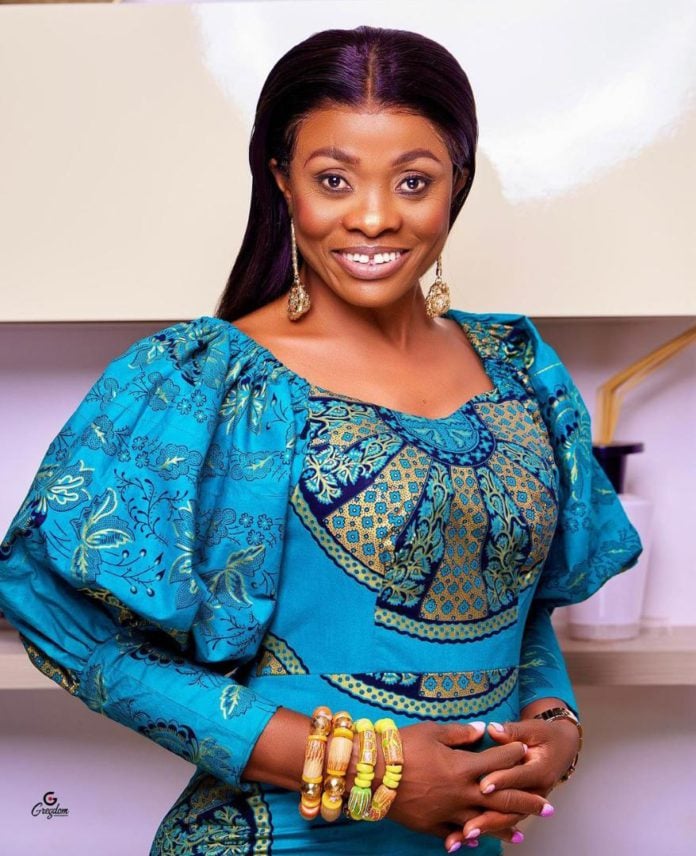Ghanaian gospel singer Evangelist Diana Asamoah has made headlines with her assertive proclamation regarding the upcoming 2024 general elections in Ghana. At a recent campaign rally in the Ashanti region, she expressed strong confidence in the governing New Patriotic Party (NPP), asserting that prayers from Reverend Isaac Owusu Bempah for former President John Dramani Mahama will not hinder the NPP from achieving what she referred to as a “divine victory.” Asamoah, known for her bold declarations in the realm of gospel music and beyond, stressed that the party’s accomplishments, particularly the flagship Free Senior High School (SHS) initiative, underpin its firm position in the electoral contest. Her remarks reflect a prevailing sentiment among key NPP supporters who are keen to emphasize their party’s successes in the face of opposition.
Drawing inspiration from biblical narratives, Asamoah likened the NPP’s aspirations to those of King Hezekiah, who fervently prayed for an extension of his life despite an impending death prophecy from the prophet Isaiah. She recounted how Hezekiah’s commitment to God led to a divine response allowing him an additional 15 years to live. By framing the NPP’s journey in a similar light, she conveyed optimism in their ability to overcome any adversity or negative forecasts regarding their electoral prospects. This biblical analogy was employed to reinforce her belief that the NPP is not only equipped to win the elections, but also to remain resilient against any foreboding predictions made by their opponents.
Asamoah’s declaration has elicited reactions within the political landscape, especially in light of the prayer session held by Rev. Owusu Bempah for Mahama, where he spoke about the former president’s beneficent nature and the likelihood of his divine favor. The implications of such public declarations from spiritual leaders can be profound, especially in a country where religion plays a crucial role in societal dynamics. By juxtaposing these two narratives, Asamoah sought to remind her audience of the enduring strength of the NPP’s track record, asserting that the combination of their achievements and spiritual backing renders any doom prophecies against them ineffective.
Moreover, Asamoah’s remarks resonate with a broader theme within Ghanaian politics—where spiritual beliefs and political fortunes are intricately intertwined. This intersection often results in religious figures positioning themselves as influential players in the political arena. The prayer by Rev. Owusu Bempah and Asamoah’s counter-narrative illuminates the ongoing tug-of-war between the NPP and the National Democratic Congress (NDC). The intense rivalry prompts both sides to seek prophetic endorsements that can potentially sway public opinion. As such, Asamoah’s emphasis on the NPP’s achievements may be perceived as an effort to rally support within the party’s base while countering the grassroots momentum the NDC seeks to build through Mahama’s candidacy.
In articulating her support for the NPP, Asamoah positioned herself not just as a singer but as an active participant in the political discourse of her country, a role that many artists take on as they seek to influence socio-political outcomes. Her ability to draw parallels between scriptural accounts and contemporary political narratives showcases the versatility with which gospel artists can wield their influence. By engaging in these discussions, they contribute significantly to the fabric of national conversation surrounding political identity, governance, and the role of faith in public life.
As these events unfold, it is evident that Ghana’s political climate is charged with spiritual and civic engagement, compelling citizens to navigate their choices through a lens of faith, aspiration, and collective identity. Asamoah’s confident assertions might galvanize support for the NPP, reinforcing the belief that their governance has brought tangible benefits deserving of electoral recognition. As the 2024 elections approach, it will be interesting to see how these narratives play out in terms of voter sentiments, party dynamics, and the role of spiritual endorsements in shaping political outcomes within Ghana.














